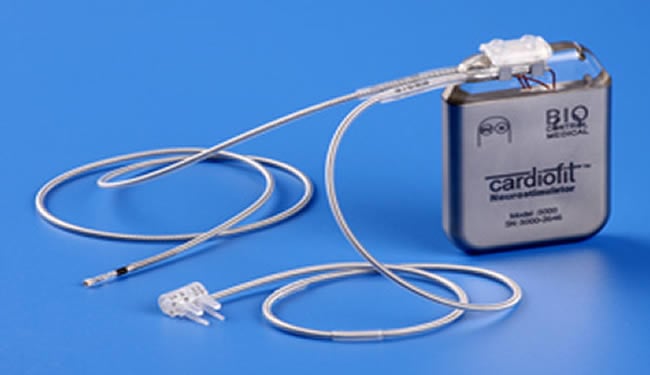University of Leicester researchers undertake revolutionary treatment of a condition that has reached ‘epidemic proportions’.
Researchers at the University of Leicester have announced that the UK’s first operation to tackle heart failure (HF) with a novel nerve-stimulating device will be performed today (Thursday August 23) at Glenfield Hospital.
The operation, which is part of a clinical trial called INOVATE-HF, could pave the way for a revolutionary treatment of a condition that scientists say has reached “epidemic proportions.”
INOVATE HF is a global investigational study to determine the safety and efficacy of the CardioFitÒ system, an implantable electrical stimulation device designed to improve heart function in patients with HF. The study will evaluate the system’s ability to reduce hospitalization and death among patients with HF, while also exploring whether combined treatment with CardioFit and prescription drug therapy is more effective than drug therapy alone.

The National Institute for Health Research Leicester Cardiovascular Biomedical Research Unit is the first site in the UK to enrol patients in INOVATE-HF. The study’s principal investigator at the site, and also the UK chief investigator, is Dr. André Ng, senior lecturer in cardiology at the University of Leicester and consultant cardiologist at Glenfield Hospital who carried out the world’s first remote heart procedure using a robotic arm alongside 3-D mapping in 2010.
“Our aim with the INOVATE-HF study is to assess CardioFit’s safety as well as its potential to improve heart function in patients with HF, thereby improving their quality of life and survival,” said Dr. Ng. “If the hypothesis is proven in the study results, this could transform heart failure treatment and would support the use of the innovative therapy over and above tablets for standard heart failure treatment.”
Heart failure is a common condition in which the heart’s pumping function is compromised, leading to a cascade of limiting symptoms and poor overall body function. HF is also associated with increased mortality from sudden death as a result of dangerous heart rhythm disturbances. The condition significantly impacts the NHS due to the level of treatment required and the increased incidence of death.
In patients with HF, the nervous system is out of balance. This imbalance leads to added stress on the heart and progressive deterioration of cardiovascular function. The CardioFit system is intended to restore balance by activating a specific part of the nervous system (called the “parasympathetic” nervous system) to reduce stress on the heart, thereby alleviating HF symptoms and reversing HF deterioration. It operates by stimulating the vagus nerve on the right side of the neck.
“This is a potentially ground-breaking treatment for desperate patients with HF, a serious condition that has increased over the past years in epidemic proportions,” Dr. Ng said. “My University of Leicester research group has been studying the relationship between vagus nerve stimulation and heart function for almost 15 years. It is really exciting that there is finally an innovative form of treatment available that will allow us to investigate its potential use in heart failure.”
Pre-clinical data suggest that vagus nerve stimulation for the treatment of heart failure improves the function of the heart and reverses negative changes to the body associated with the condition. Moreover, the safety and performance of the CardioFit have been validated in a 32-patient, multi-centre, pilot clinical study conducted in Germany, Italy, The Netherlands and Serbia. Study data showed that patients experienced significant improvements across key clinical measures, including left ventricular function and structure, heart rate variability, and resting heart rate. Patients also showed improvement in self-reported quality of life surveys and six-minute hall walk tests. The INOVATE-HF study will broaden the research of CardioFit by enrolling more than 600 patients at up to 80 centres worldwide. The study investigates patients diagnosed with HF, aged 18 and over, who are being treated with a combination of medicines, but continue to have symptoms such as shortness of breath and fatigue.
“The INOVATE-HF study is representative of the world-class research being conducted at the University of Leicester to deliver improved patient care in hospitals,” said Dr. Ng. “It epitomises the essence of good translational scientific research, where a firm scientific basis in the university lab is now applied to the clinical condition of heart failure.”
Professor Huon Gray, Interim National Clinical Director for Cardiovascular Disease said: “We know that heart failure can have a devastating effect on people’s lives, so any potential advance in its treatment is to be welcomed.
“Despite a 40 percent drop in the number of deaths from heart disease over the last decade, cardiovascular disease remains a major cause of death and disability, and heart failure is one of the areas where we need to do more to improve results for patients. We are committed to supporting any work which helps us achieve this, and we welcome all such innovative research.”
Notes about this medical research
The INOVATE-HF study team at the University of Leicester includes Matt Bown, senior lecturer in vascular surgery; Iain Squire, professor in cardiovascular medicine; Kieran Brack, BHF intermediate basic science research fellow and research coordinator for the trial; and other members of the University Hospitals of Leicester. The study is sponsored by BioControl Medical (Yehud, Israel), the developer of the CardioFit device.
This news release describes independent research funded by the National Institute for Health Research (NIHR). The views expressed are those of the author(s) and not necessarily those of the NHS, the NIHR or the Department of Health.
Contacts: Ather Mirza – University of Leicester press office
Peter Thorley – University of Leicester press office
Source: University of Leicester press release
Image Source: Cardiofit image adapted from University of Leicester press release image
Original Research: The research is part of an international clinical trial called INOVATE-HF. You can read about the clinical trial details here.







